Stroke rehabilitation at NIKISA Geriatric and Rehabilitation Hospital
Stroke rehabilitation is an important part of recovery after stroke. It is expected that after obtaining Critical care at an acute care hospital, stroke patients come to NIKISA Geriatric hospital for further recovery. NIKISA hospital will not admit the stroke patients immediately after stroke. The goal of stroke rehabilitation is to help the stroke affected patient to relearn skills which was lost when the stroke affected the brain. Stroke rehabilitation will help to regain independence and improve the quality of life of the stroke patient. The severity of stroke complications and each person's ability to recover vary widely.
Approach at NIKISA to stroke rehabilitation
Treatment of Stroke patients who require Critical care
These patients are the ones who require high degree of care. Following is the criteria used to recognise Stroke patients who require critical care:
- Completely immobile and are in Supine position.
- Discharged from acute care hospital with cannula, Riels tube, and catheters.
- The acute care hospital has done Tracheostomy.
- Patients requiring Medical Oxygen, either continuous or on intermittent basis.
- Stroke patients who require suctioning on account of Phlegm build-up
- Stroke patients who are weak and completely bed ridden and therefore cannot communicate in an understandable manner with service providers.
- These patients are admitted to Critical care section till they attain a non-critical stage.
- Critical care section is almost like an intensive care unit and has the following facilities.
- Patients are provided with Fowlers bed.
- Continues Medical oxygen supply facility is available in this section.
- There are duty doctors at this section on 24 X 7 basis.
- Patient monitors, suction facility is also available.
- There is a minor OT in the Critical care section to do procedures on emergency basis.
- Required activities like Chest physiotherapy, Suction etc are performed on bed side.
- Visitor entry is also restricted.
- Emergency cart is readily available. Emergency medicines provided by the hospital are to be replenished by the patient’s caretakers.
- Medicines and other consumables can be bought from the Hospital Pharmacy or from any other pharmacy and provided to the treating doctors and nurses.
- The Nutritionist guides the patients and their families on dietary requirement of the patients. Patients can get their diet from their homes. External catering services are also available.
- Once, the patients recover from critical condition, they are shifted to wards, specially created for rehabilitation of Stroke patients. In case the patient turns out to be more critical, the family members will be requested to shift the patient to an acute care hospital for further acute care.
Treatment of Stroke patients who do not require Critical care
- Patients who do not come under the above criteria.
- Patients who can be mobilised on wheel chair or on foot with or without support.
- Patients who are normal except for stroke related mobility of limbs and speech. They are able to eat normal food and do not require high degree of medical supervision.
- Stroke patients who do not require Critical Care in the judgement of NIKISA are moved towards created for stroke recovering patients.
- Physical facilities at the Stroke rehabilitation wards:
- All the wards are provided on Single Occupancy basis.
- These wards are fully equipped and have been designed keeping in mind the requirement of Stroke patients.
- Corridors have been provided with rails for holding while walking.
- Toilets are at ground level for easy mobilization of patients both on foot and also on wheel chairs.
- Grab bars have been provided in bathroom and toilets.
- Bed required for the convenience of patient will be provided. Option of utilising Fowler beds with air bed or luxury single bed or luxury double bed is provided to the patient.
- Every ward is provided with attached bath rooms with hot and cold-water supply, western commode, Meals table, T V, Fridge, Nurse call facility, newspaper and Drinking water.
- Services of Nurses and ward boys is available on 24 X & basis.
- The wards are centrally air conditioned. (on account of Covid 19 restrictions AC is not being used for the present). Every ward is provided with pedestal fan.
- Some rehabilitation equipment are provided at ward itself depending on the requirement of the recovering patient.
- Medical and Diet care:
- The patients are examined and treated by a team of doctors on a daily basis. In addition, whenever required our Specialists provide consultation to the patients.
- Proper nutrition and taking medication as per the prescription of nutritionist and the treating doctor respectively is of paramount importance in stroke recovery. Our Nutritionist will guide the patients and their families on dietary requirement of the patients. Patients can get their diet from their homes. External catering services are also available.
- Usually Stroke patients suffer from disorders like diabetes and hypertension. We monitor the vital parameters.
- Most stroke patients get into a sedentary status, especially in-home settings and many develop secondary complications arising out of poor hygiene. Bed sores, urine and incontinence are very common in recovering stroke patients; therefore, we monitor the patients for these secondary complications and take remedial actions.
- Secondary Injuries arising out of unexpected fall is very common in stroke patients. When untrained personnel handle stroke patients some might suffer from limb and girdle fractures.
- Medicines and other consumables can be bought by patient’s caretakers from the Hospital Pharmacy or from any other pharmacy and provided to the treating doctors and nurses.
- Physiotherapy:
- A separate Physiotherapy section has been created to aid speedy recovery. To know more about Physiotherapy facilities available please click Physiotherapy section
- Physiotherapy is provided by a team of Physiotherapists.
- Progress in physiotherapy and rehabilitation is measured and recorded on a week to week basis.
- Cognitive and emotional therapy:
- Therapy for cognitive disorders. Cognitive therapy helps the patient to get back lost cognitive abilities, such as memory, processing, problem-solving, social skills, judgment and safety awareness. Our Psychologist provides these services.
- Therapy for communication disorders. Speech therapy can help to regain lost abilities in speaking, listening, writing and comprehension. Our Speech therapists provide these services.
- Psychological evaluation and treatment.Emotional disturbance of stroke patients will be addressed with proper counselling. Our Psychologist provides these services.
Non-Clinical Services
- Non clinical services towards the patients like bathing. dressing, spoon feeding. nasal feeding, toilet assistance, changing of diapers will be attended by the hospital staff.
- Toiletries and towels will not be provided by the hospital. But, they, can be purchased at the pharmacy.
- Care takers of patients can stay at the hospital at the ward assigned to the patients. Except providing a foam bed nothing else will be provided to the patient attendant.
Physiotherapy facilities at NIKISA Geriatric Centre and Rehabilitation hospital for Stroke patients.
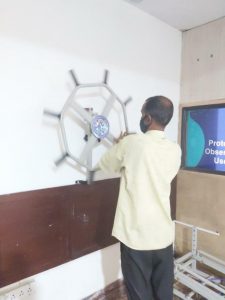
Shoulder Wheel
Resistance for strength developing. Ideal for shoulder, wrist and forearm exercise.
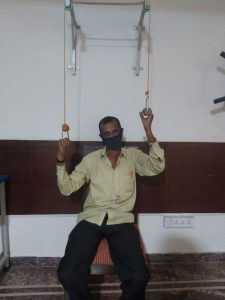
Multi Purpose Exercise Chair
Can perform various routines that will allow you to maintain the mobility of muscles and joints.

Ankle Exerciser
These exercises on ankle exercises are designed for rehabilitation of ankle sprains.

Nirmal hand
It is fitted with Pulleys, Leather loops for Finger hold, Weight-sets for Fingers, Hand, & Wrist exercises.
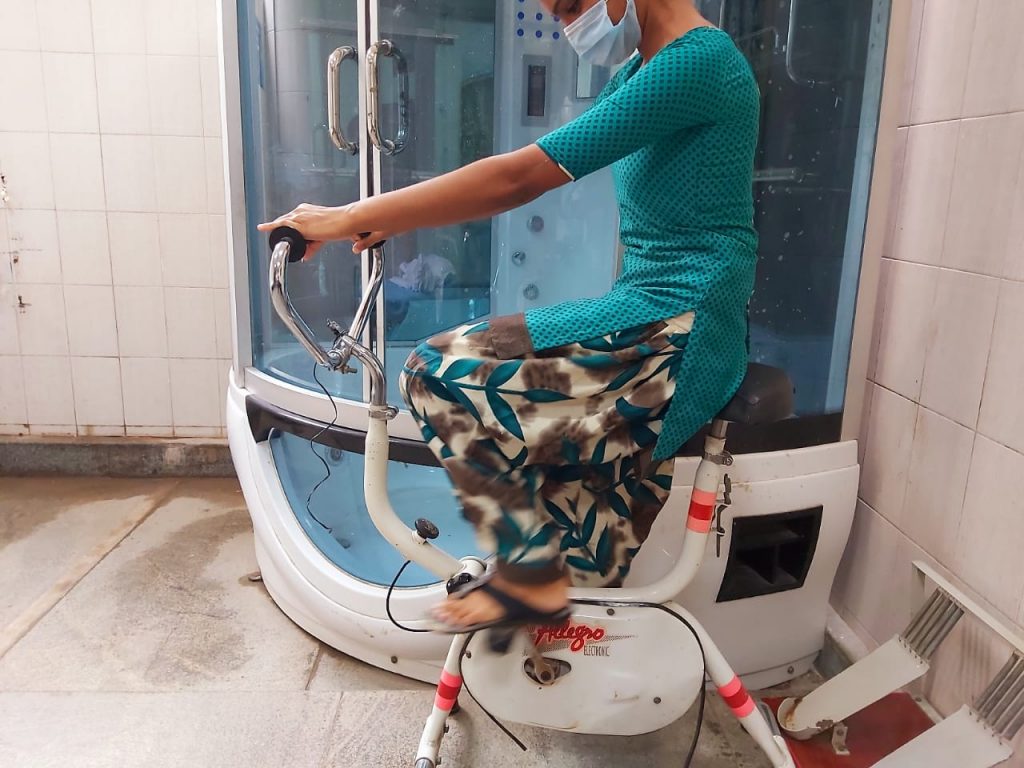
Static Cycle
Cycling is a gentle, low-impact sport that gives your cardiovascular system an effective workout.
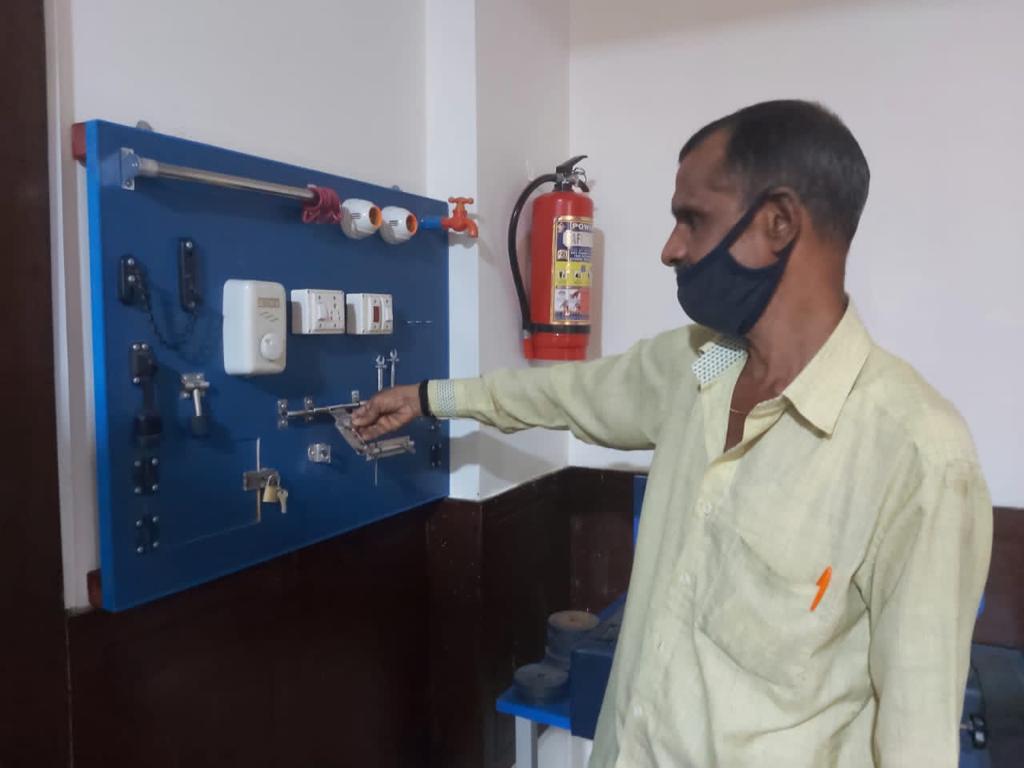
ADL Board
ADL are self-help or care activities. These activities can include everyday tasks such as dressing, self-feeding, bathing, laundry.
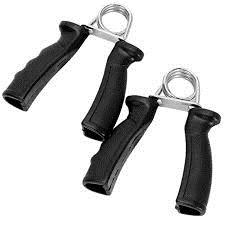
Hand gripper
Keep your hand active and strong with this black finger grip exerciser from the newest collection. It is used for hand and finger exercise in physiotherapy .

Wrist Circumstancer
Wrist Circumstancer helps your wrists and hands to exercise and helps with multiple smaller joints between the radius and ulna of the forearm.
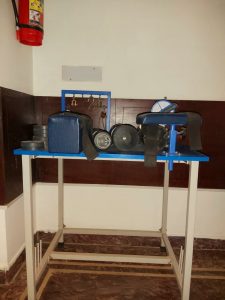
Arm Exerciser
It is used for physical and mental fitness of the clients.
It provides low impact exercise to increase strength & flexibility. It is Versatile for arm exercise. It Promotes blood circulation
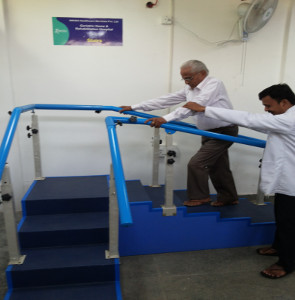
Stair Case Corner
This stair case provides efficient grip for the steps. This is used for providing limb exercises to the stroke and trauma patients.
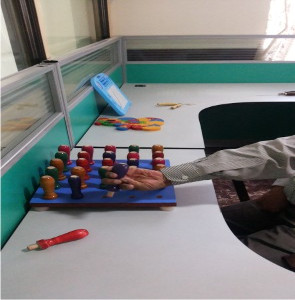
Peg Board
The pegboard conducts testing for the gross movements of hands, fingers and arms.
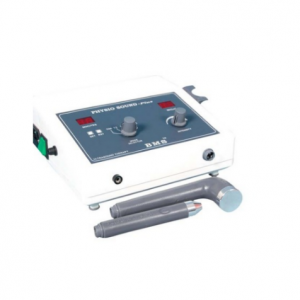
Ultrasound Therapy
These are electrical equipment which provide ultrasound therapy for pain redress. This is used on Stroke patients and also on patients with muscular pain.